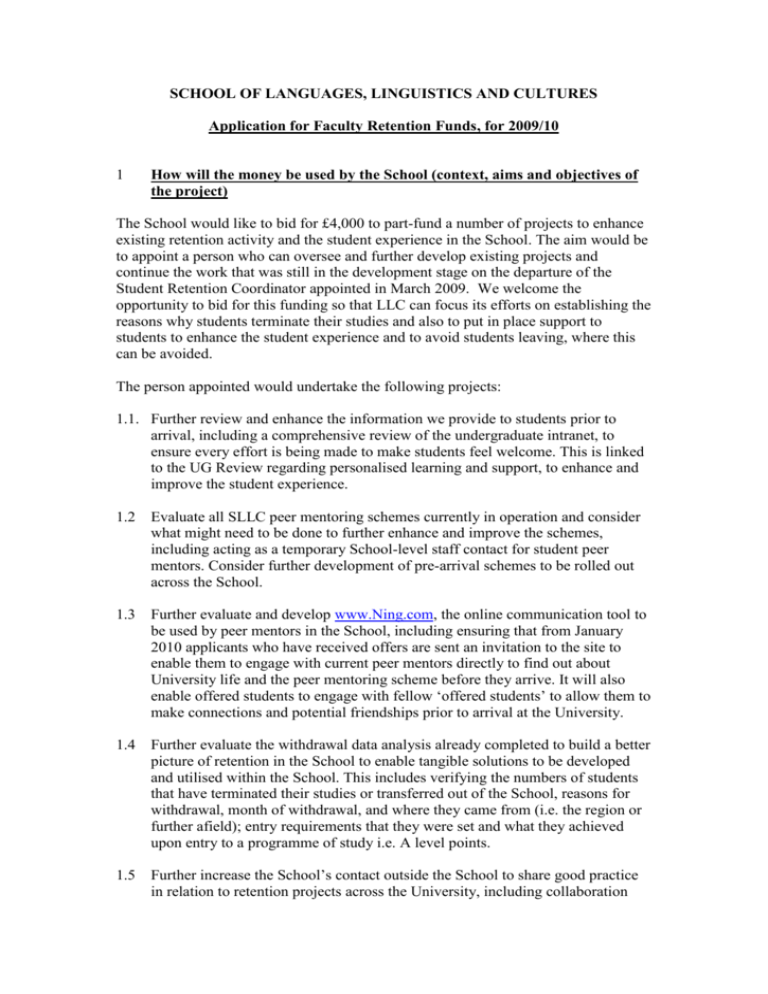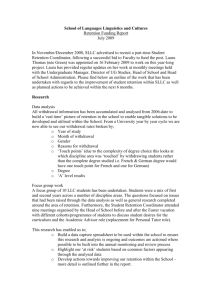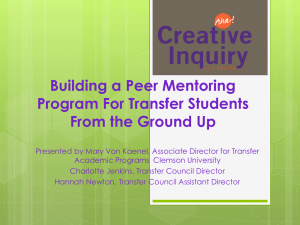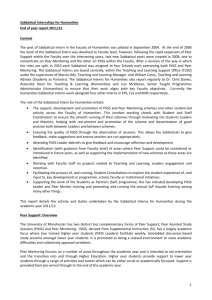school of languages, linguistics and cultures
advertisement

SCHOOL OF LANGUAGES, LINGUISTICS AND CULTURES Application for Faculty Retention Funds, for 2009/10 1 How will the money be used by the School (context, aims and objectives of the project) The School would like to bid for £4,000 to part-fund a number of projects to enhance existing retention activity and the student experience in the School. The aim would be to appoint a person who can oversee and further develop existing projects and continue the work that was still in the development stage on the departure of the Student Retention Coordinator appointed in March 2009. We welcome the opportunity to bid for this funding so that LLC can focus its efforts on establishing the reasons why students terminate their studies and also to put in place support to students to enhance the student experience and to avoid students leaving, where this can be avoided. The person appointed would undertake the following projects: 1.1. Further review and enhance the information we provide to students prior to arrival, including a comprehensive review of the undergraduate intranet, to ensure every effort is being made to make students feel welcome. This is linked to the UG Review regarding personalised learning and support, to enhance and improve the student experience. 1.2 Evaluate all SLLC peer mentoring schemes currently in operation and consider what might need to be done to further enhance and improve the schemes, including acting as a temporary School-level staff contact for student peer mentors. Consider further development of pre-arrival schemes to be rolled out across the School. 1.3 Further evaluate and develop www.Ning.com, the online communication tool to be used by peer mentors in the School, including ensuring that from January 2010 applicants who have received offers are sent an invitation to the site to enable them to engage with current peer mentors directly to find out about University life and the peer mentoring scheme before they arrive. It will also enable offered students to engage with fellow ‘offered students’ to allow them to make connections and potential friendships prior to arrival at the University. 1.4 Further evaluate the withdrawal data analysis already completed to build a better picture of retention in the School to enable tangible solutions to be developed and utilised within the School. This includes verifying the numbers of students that have terminated their studies or transferred out of the School, reasons for withdrawal, month of withdrawal, and where they came from (i.e. the region or further afield); entry requirements that they were set and what they achieved upon entry to a programme of study i.e. A level points. 1.5 Further increase the School’s contact outside the School to share good practice in relation to retention projects across the University, including collaboration with the Faculty Sabbatical Intern and participation in the Humanities Study Skills Network. 1.6 As part of the process of induction for new students, to further establish contacts between peer mentors and student societies/networks and student representatives. 1.7 Analyse data obtained from ‘at risk’ questionnaire completed by first years students during induction September 2009. 1.8 Organise focus groups of students for feedback on induction and admissions to further enhance and improve School induction and the student experience. 1.9 Review (in liaison with the UG Director and UG Manager) and monitor the use of the PDP in line with University recommendations about the Higher Education Achievement Record. 1.10 Review SLLC performance in NSS, i.e. although the School performed well last year in comparison to other Schools in the University, it would like to find out why, possibly by contacting graduates, to further share good practice across SLLC. 1.11 In liaison with the UG Manager and UG Coordinators, review and monitor general work and attendance procedures. 1.12 Improve communication across the School by providing enhanced feedback mechanisms from and to Staff-Student Consultative Committees, including use of online communication tools. 1.13 Review pilot Academic Advising Schemes implemented for the first time in September 2009 in LEL, ESML and language classes in East Asian Studies. Work with academics to find ways of strengthening student relationships and the individual learning experience. 1.14 Review the course unit selection process and development of more ‘userfriendly’ course unit and programme regulations information. 2. How much input the project will require from the Faculty Sabbatical Intern. We would like the Faculty Sabbatical Intern to support the person appointed in the completion of peer mentoring projects outlined above, possibly 10 hours per semester. 3. Which subjects/programmes will benefit from the project All programmes in the School will benefit from the projects undertaken. 4. The scale of impact, in terms of numbers of students affected All students should be affected by the measures to be implemented, especially if staff-student communication across the School can be enhanced and improved. 5. How the success of the project will be measured We will regularly monitor the student registration data and the projects undertaken via the reporting mechanisms of the School Undergraduate Programmes Committee and Staff-Student Consultative Committees. 6. How will the project be supported after the Faculty funds cease The School will continue this appointment, if approved by Faculty, in 2010/2011. Krys Chandler, Head of School Administration Liz Nolan, UG Manager 28 October 2009











